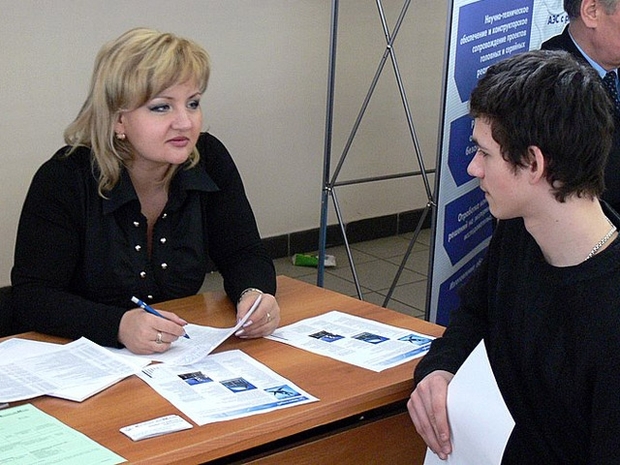Sergey Salikov, ANKOR: ‘Unemployment is growing and the most dramatic – the increase is among youth’
Sergey Salikov, Director General of one of the largest recruiting agencies in the country — personnel holding ANKOR admitted that the country is in a deep stagnation, but it's not as terrible as it was in 1998. He said in an interview with Realnoe Vremya the specialists of which sectors are the most mobile, what an employer forgets about and what time bombs youth unemployment contains.
'The most mobile specialists throughout the world – is IT-specialists and representatives of the oil and gas sector'
Sergey Nikolaevich, could you tell us about your new large-scale research in the field of mobility in the IT industry.
The mobility issue in Russia is urgent because in today's global economy the mobility is one of the factors boosting the competitiveness of individual corporations as well as the states in general.
Historically, the highest mobility level of the population is in the United States, Russia is not among the countries-leaders in the mobility. In order to evaluate the flexibility of the representatives of a particular industry – IT industry – in relation to the cross-functional transitions, the change of residence and forms of employment, ANKOR has conducted the study 'The staff mobility in IT industry'. The study, in particular, reveals what is important for the employee who is thinking about moving. In the first place — housing. In contemporary Russia the housing problem is really urgent – it has developed historically that way, and, unfortunately, there is no significant improvements. There is a mortgage programme to improve the housing situation, but it 'kills' the mobility. Another aspect of the housing issue in the context of mobility: in the cities, where the employees are proposed to move, the infrastructure is very poorly developed, which is also a factor that encourages specialists to abandon the idea of relocating.

The mobility issue in Russia is urgent, because in today's global economy, the mobility is one of the factors boosting competitiveness of individual corporations as well as of states in general
The second point that is important to the employees and to which, unfortunately, the employers do not pay enough attention – it is the compensation for the costs connected with relocation, the provision of a full medical insurance at a new place. It should be taken into account that if an employee does not take a family with him, it reduces the cost of the relocation, but there will have to pay for tickets once a quarter or every six months, so he or she could go to the family. These are very important points, and the lack of attention paid to them by the employers often becomes the limiting factor.
Nevertheless, the results of ANKOR study reveals that staff mobility in the Russian IT industry is high, and it is due to a number of reasons.
The most mobile specialists throughout the world – it is IT-specialists and representatives of the oil and gas sector. In the second case, the high mobility of staff is due to the fact that in the oil and gas sector the infrastructure-social component is very strong – companies build towns and fully provide the entire staff who make the decision to relocate. There is also no problems concerning wages, because everyone understands that a specialist will not sign the contract suggesting a salary lower than what he or she has now. There are no such towns for IT specialists, unfortunately, except a few very famous (I hope Innopolis will be included in the world ranking of IT-cities). But the reward issue is about the same. That is, if you are an IT specialist and work in Moscow, a Russian or a foreign famous company invites you and offers to move to Tomsk for a year and a half, you can be sure that you will be offered much greater reward than you have now. Primarily, you will be interested in the importance of global challenge, an interesting project, because it is the foundation stone of your future career.
Now it seems that the government really pays much attention to the education of IT specialists. How does it affect the labour market?
I do not see an increased attention to this industry, and it is not necessary. Healthy, actively growing industry does not require special support from the state.

'In order the country has IT-future and was not a 'banana republic', about 1% of able-bodied population, that is, about 1 million people in Russia should be IT specialists.' Photo: ifmo.ru
Now many people talk about it.
You know, they say a lot. They talked a lot about the Loch Ness monster, but it still has not been seen. An industry, where everything is developing properly, is regulated not by the state but the market: the market is stronger than the state. Economic laws are stronger than political ones.
Why is the labor market developing that way in the IT field? In Russia there are about 4 000 specialists in different areas. It is known that in order the country has IT-future and was not a 'banana republic', about 1% of able-bodied population, that is, about 1 million people in Russia should be IT specialists. So, there are no vacancies actually – they are 700-800 thousand, but the number of specialists is significantly less now – about 400 thousand. That is, we already see the deficit, and it is not in tens but hundreds of thousands of employees. Russian universities graduate annually about 60-70 thousand specialists. Subtract 400 thousand from 800 thousand, divide by 60 thousand, and we will get about 6 – it is the years that it will take to meet only the current need for IT-specialists. But there is another problem – that is, woe from wit – the level of education of domestic IT specialists is very high and definitely is very valued in the international market. Accordingly, they are very desirable for Western companies that highly successful 'repurchase' them. Thus, the shortage of personnel in the IT-industry is growing.
'It is not very bad, but the hidden unemployment is growing'
It would be interesting to talk about the labour market in the period from 2014 to 2016. What are the trends? What has changed during this time?
You can see the official unemployment figures on the website of Rosstat.
They say that everything is quite good...
It is quite good, but the hidden unemployment is growing. People do not go to the labour exchange, but they are unemployed. It often happens that people go on leave without pay, entered shift is introduced. You had a thousand people, and now 500 jobs, 500 work till noon, 500 — after. The real incomes are falling.

Real income from month to month is falling in relation to the same period of last year. This suggests that there is hidden unemployment, hidden forms of reduction of working time, latent forms of reduction of income
That is, is it really happening now?
It has been happening for two years already. You know, there is one little factor that, even comparing the data of Rosstat, will say that something is behind this. If the unemployment is not growing, the employment remains the same and the official statistics show that wages do not increase, but do not decrease as well and remain at a certain level. At the same time, Rosstat indicate the monthly drop in consumer demand in Russia. I have a question: why consumer demand is dropping if people earn the same amount. Are prices rising? You don't buy Mercedes car every year.

'Slightly less than one-third of all unemployed – it is young people, it is very much. It is very difficult to find a job for graduates of universities, technical schools, colleges in the specialty appropriate to their demands.' Photo: svidetel24.info
Slightly less than one-third of all unemployed – young people
Is there a hidden unemployment among young people, too?
The unemployment is not hidden here. Slightly less than one-third of all unemployed – it is young people, it is very much. It is very difficult to find a job for graduates of universities, technical schools, colleges in the specialty appropriate to their demands. The latter is, of course, a separate question, especially in large cities.
But youth unemployment is growing, it is very bad for society and, moreover, it is dangerous.
What consequences can be?
They are quite simple. They are three types. The first one is the deterioration of criminogenic situation because it is not the pensioners who form street gangs. The second one is the generation of the dependency of among young people. That is, at the time when it is necessary to forge their future and the future of their country, they live, relying on mom and dad's money, grandmother's pension, some random earnings. We can lose a whole segment of our society, young people who just should 'seize' lands.
And, third, it had already been in our history, we can face a situation of lost generation. After some time we will not have neither normal managers nor producers.

'The demands of young specialists without experience who graduate from the capital's universities are very different. They are very ambitious, their base salary expectations are 50% higher than employers actually offer.' Photo: narazvilkah.ru
'The applicants are ready to consider the positions, the salary level of which is 10-15% lower'
It would be interesting to talk about incomes. How have salary expectations changed for the three years?
In those sectors, which are undergoing serious pressure from the crisis, people, feeling the danger, ready to accept job offers that do not suggest a salary increase. And under certain conditions – for example, if they lose their jobs, the applicants are ready to consider the positions, the salary level of which is 10-15% lower than at the previous place of work. There are sectors that are developing despite the crisis. In particular, the IT industry. In 2015 in comparison with 2014, wages increased by about 20-25%, in 2016 in comparison with 2015 — at a conservative estimate — the growth may be up to 40%.
The demands of young specialists without experience who graduate from the capital's universities are very different. They are very ambitious, their base salary expectations are 50% higher than the employers actually offer. Moreover, they offer these positions to the professionals with experience, and the youth often wants a salary a half times higher with no experience. It is the specificity of generation Y. It is not bad, we just need to learn to work with it. This specificity speaks about very fast career expectations. I'm talking about the capital cities, where there are great labor markets despite the crisis in the country.

'The pharmaceutical industry is developing well, sales and production in the field of consumer goods.' Photo: pharmvestnik.ru
That's interesting, what industries feel good?
You will not believe, but in the capital the retail feels itself very good. Despite the fact that the number of major players in this industry have problems, currently we are seeing an increase in the number of vacancies in retail companies. The pharmaceutical industry is developing well, sales and production in the field of consumer goods. The difficult situation is in the banking sector. Difficult is the situation in the oil and gas sector, many projects of the leading oil companies are being frozen, are in a state of freeze. But it is a common thing, it is cyclic. The oil price will rise and many projects will again become profitable, which would entail wage growth, opening new vacancies.
In general, I do not see drama in the labor market. This stagnation, the crisis is going the third year, and it's a lot. But I have been in the industry for 22 years. I remember the 1990s, remember 2000s. You know, it's okay.
Perhaps, the worst crisis in Russia was in 1998, because then the country was fragile, the economy was unsettled, unclear and non-transparent political system. The global crisis of 2008 horrified the world. But due to the Stabilization Fund, our country endured it quite well: already in 2010 there was a growth, in 2011, 2012 and partly in 2013, the economy in many sectors developed rapidly. That is why many industries 2014 was a shock. But again, I repeat: nothing bad is happening.